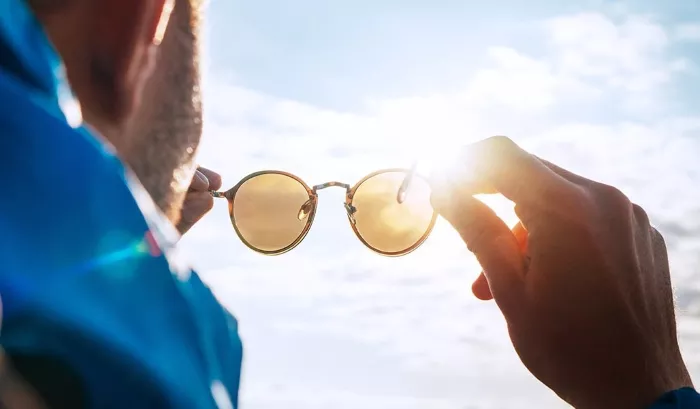UV glasses have become increasingly popular, with many people wondering if they truly protect their eyes from harmful ultraviolet rays. The short answer is yes—high-quality UV glasses do work, but not all glasses are created equal. This article explores how UV glasses function, their benefits, and how to choose the right pair for optimal eye safety.
How Do UV Glasses Protect Your Eyes?
Ultraviolet (UV) radiation from the sun can damage your eyes over time, leading to conditions like cataracts, macular degeneration, and photokeratitis (a sunburn-like condition on the cornea). UV glasses are designed to block these harmful rays, reducing the risk of long-term eye damage.
There are three types of UV rays:
UVA (long-wave) – Penetrates deep into the eye, potentially harming the retina.
UVB (short-wave) – Mostly absorbed by the cornea but can still cause damage.
UVC – Blocked by the Earth’s ozone layer, so it’s not a concern.
Quality UV glasses block 100% of UVA and UVB rays, providing full protection.
Do All Sunglasses Offer UV Protection?
Not all sunglasses block UV rays effectively. Some cheap or fashion sunglasses may have dark lenses but lack proper UV coatings. Dark lenses without UV protection can actually be worse than no glasses at all because they cause your pupils to dilate, allowing more UV light to enter your eyes.
To ensure your sunglasses offer real protection, look for labels like:
“UV400” – Blocks all light wavelengths up to 400 nanometers (covering UVA and UVB).
“100% UV protection” – Meets the highest standard for blocking harmful rays.
Benefits of Wearing UV Glasses
Prevents Eye Diseases – Long-term UV exposure increases the risk of cataracts and macular degeneration. UV glasses help reduce this risk.
Reduces Glare – Polarized UV glasses minimize glare from surfaces like water and roads, improving visibility.
Protects Delicate Skin – The skin around your eyes is thin and prone to sun damage. Wraparound UV glasses shield this area.
Enhances Comfort – Bright sunlight can cause squinting and eye strain. UV glasses make outdoor activities more comfortable.
How to Choose the Best UV Glasses
Not all UV glasses are equally effective. Follow these tips to pick the right pair:
1. Check for 100% UV Protection
Always verify that the glasses block 100% of UVA and UVB rays. If the label doesn’t specify, assume they don’t offer full protection.
2. Consider Lens Color (But It Doesn’t Affect UV Protection)
Darker lenses don’t necessarily block more UV rays—the protection comes from a special coating. However, different tints can help in various conditions:
Gray lenses – Reduce brightness without distorting colors (great for driving).
Brown/amber lenses – Enhance contrast, useful for sports.
Yellow lenses – Improve visibility in low light but aren’t ideal for bright sun.
3. Look for Polarized Lenses (For Extra Comfort)
Polarization cuts glare from reflective surfaces, making them ideal for driving, fishing, and snow sports. However, polarization alone doesn’t block UV rays—ensure they also have UV400 protection.
4. Choose the Right Frame Style
Wraparound frames – Provide the best coverage, blocking light from the sides.
Large lenses – Cover more of the eye area for better protection.
5. Avoid Cheap, Uncertified Glasses
Fake or low-quality sunglasses may claim UV protection but fail to deliver. Buy from reputable brands or optical stores.
When Should You Wear UV Glasses?
Bright sunlight – Essential for beach trips, hiking, and driving.
Snowy environments – Snow reflects up to 80% of UV rays, increasing exposure.
High-altitude locations – UV exposure increases with elevation.
Near water or sand – These surfaces reflect UV rays, intensifying exposure.
Can UV Glasses Help with Digital Eye Strain?
Some blue light glasses claim to reduce eye strain from screens, but they’re different from UV glasses. UV glasses are for outdoor sunlight protection, while blue light glasses target artificial light from devices. However, some glasses combine both features.
Conclusion
Yes, high-quality UV glasses are effective at protecting your eyes from harmful ultraviolet rays. The key is choosing glasses with 100% UV400 protection and wearing them whenever you’re exposed to sunlight. Investing in a good pair can help prevent long-term eye damage and keep your vision healthy for years to come.
If you’re unsure about your current sunglasses, an optometrist can test their UV-blocking ability. Don’t take chances with your eye health—proper UV protection is a must!
Related topics:
Is Retinal Detachment Surgery Painful?
Bilateral Cataracts: Causes, Symptoms, and Treatment Options
Do Floaters Go Away After Retinal Surgery?


